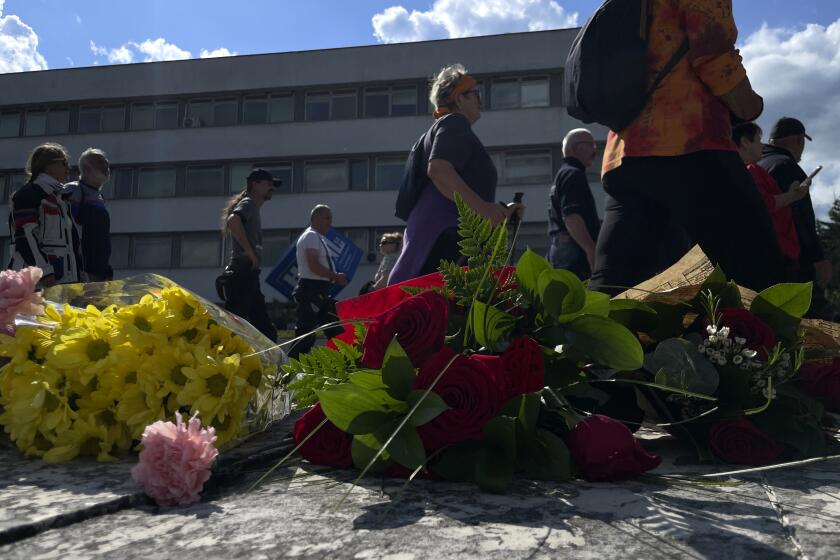The Last ‘Soldier’ Falls
When the last fugitive member of the so-called Symbionese Liberation Army appeared in a South Africa court this week, dozens of colleagues at the university where he was a lecturer turned out to cheer him. They called James Kilgore -- they knew him by a false name -- a caring man, deeply committed to social causes. Friends and neighbors said similar things about four other former SLA “soldiers” who had gone on to be parents and professionals with mortgages, no more a threat to society today than, well, Myrna Opsahl was 27 years ago when she went to deposit church collections at a suburban Sacramento bank and was shot to death during a robbery.
Emily Montague, Bill Harris, Michael Bortin and Sara Jane Olson pleaded guilty last week to second-degree murder in that 1975 slaying. A day later, Kilgore was arrested in Cape Town. He is awaiting extradition and reportedly negotiating for the same six-to-eight-year sentence reached in the others’ plea agreements.
The mystery is not how these graying baby boomers, now older than the mother of four they left to bleed to death, went on to live upstanding, middle-class lives but how they lived almost three decades with their own lies. The first lie was that the mayhem wrought by their crackpot band of wannabe revolutionaries was a normal response to abnormal times -- a reaction to the turbulence of the war in Vietnam and other upheavals of the late 1960s and early 1970s. While millions of protesters marched peacefully for free speech, civil rights and an end to the war, the SLA’s first act -- soon overshadowed by the kidnapping of newspaper heiress Patty Hearst -- was assassinating Oakland’s first African American school superintendent for supporting mandatory high school IDs. Some revolution.
Harris and Montague served eight years in prison for the Hearst kidnapping and other crimes; the late recruit Olson, like Kilgore, went underground. All vehemently denied having anything to do with the robbery-turned-homicide, even after Olson’s 2000 arrest on decades-old charges of conspiring to plant pipe bombs under Los Angeles police cars triggered the reopening of the case. They denied it, that is, until the making of a plea agreement, which the Opsahl family supported on the condition that the defendants publicly acknowledge responsibility. In court last week, one by one, they did so.
The slaying, said Montague, a computer consultant who lived in Altadena until her arrest, was “something I’ve thought about every day for the last 27 years.” For the Opsahl family’s sake but also for Montague’s, Harris’, Bortin’s and Olson’s, we can only hope that such remorse was true, however many decades delayed.
More to Read
Start your day right
Sign up for Essential California for news, features and recommendations from the L.A. Times and beyond in your inbox six days a week.
You may occasionally receive promotional content from the Los Angeles Times.






